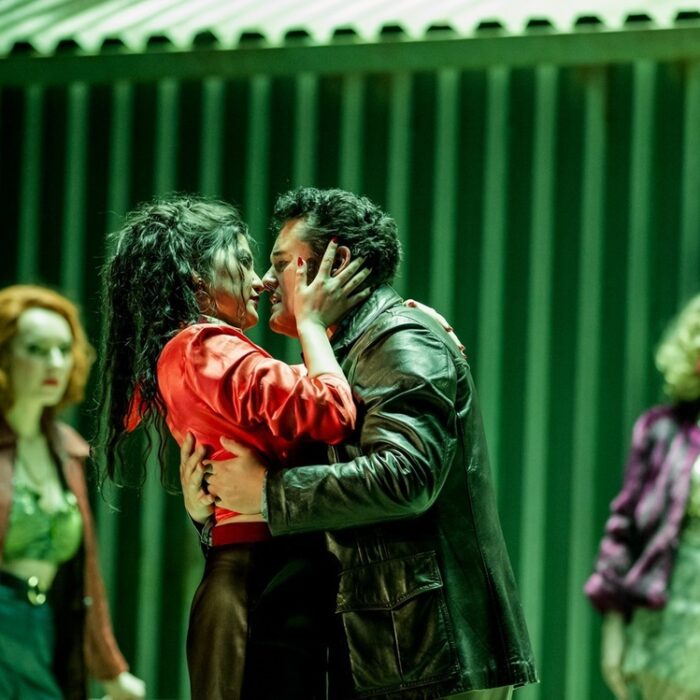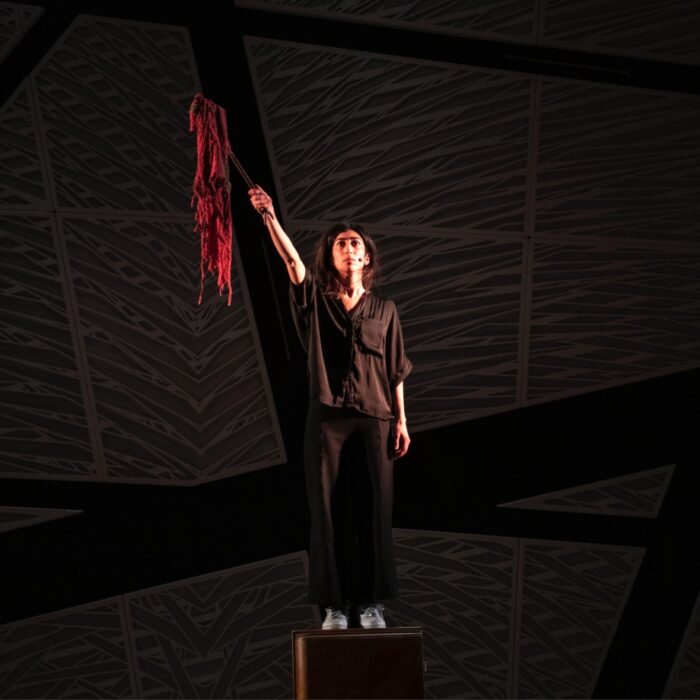
CD Review: New Focus Recordings John Aylward’s ‘Oblivion’
By Joe CadaginThe doctrine of Purgatory, largely based on a few vague lines of apocryphal scripture, is an oft-misunderstood facet of Catholicism. The catechism never explicitly refers to it as a place. Rather, it’s described as a process of purification for dead believers who must be fully cleansed before entering heaven. Of course, this hasn’t kept artists and theologians from imagining purgatory as a physical space and speculating on how expiation is attained there. Dante conceived of it as a terraced mountain scaled by penitent souls. At its peak flows the River Lethe, which wipes their memories clean, followed by the Eunoe, which recovers only good memories.
John Aylward’s 2022 chamber opera “Oblivion,” released on New Focus Recordings, presents a vision of purgatory indebted to Dante. Only, the “rules” of Aylward’s afterlife are far less clear-cut than in the “Divine Comedy.” The composer’s self-written libretto opens on a scene redolent of “Die Walküre”: lost in a stormy wilderness, two amnesiac Wanderers—one male, one female—seek shelter in the hovel of a Hunter. Here they also encounter a madman held captive by their churlish host. These two figures offer the Wanderers conflicting routes to redemption. The Hunter contends that salvation is won by enduring the hardships of the wasteland beyond his door. But the madman, claiming to be the King of this realm, instructs them to drink from a memory-restoring fountain and atone for every sin they recall.
The opera is less a manual for the next life than an allegory for the present one. In response to his Catholic upbringing, Aylward examines the usefulness of atonement, even questioning whether it’s truly achievable. “Redemption is an allusion,” female Wanderer concludes. Indeed, at the opera’s outset, the two protagonists exist in a blissfully ignorant freedom, like Adam and Eve. But when the male Wanderer is tempted into tasting the mnemonic water, the knowledge of his prior transgressions only induces further wrongdoing. Rather than asking forgiveness of the female Wanderer, who turns out to have been his wife, he projects his guilt onto those around him—ultimately committing a terrible evil in the name of “justice.”
In this, his second opera, Aylward has crafted a brilliant piece of drama that ranks among the classics of absurdist theater. And like all great works, “Oblivion” continuously divulges new layers of meaning. In the space of an hour, Aylward lays out a vast moral and philosophical labyrinth for the listener to roam. Its complexities and ambiguities are unsolvable, and by the final scene, one gets the sense of being suspended in their own infinite and inescapable limbo.
Aylward’s musical world can only be described as purgatorial. The prologue commences with an electronic evocation of nothingness: a grey, whooshing soundscape like the echo of a cavern. Our four instrumental soloists, led by conductor Stratis Minakakis, gradually materialize out of this abyss. The unusual scoring for double bass, cello, viola, and electric guitar in lieu of violin generates strange, ethereal timbres. Very often, the low strings will float motionlessly on droning Wagnerian or Debussyian harmonies while guitarist Daniel Lippel pendulates tentatively between two pinging pitches.
The accompaniment always seems to linger hesitantly on the verge of something that never quite arrives. As the story unfolds, the players—much like the characters—attempt to break out of their inertia with impotent, endlessly circling gestures that only give the appearance of activity. The score’s central motive is a perpetually zigzagging figure—alternating ascending and descending intervals that expand progressively like a wedge before inevitably returning to the center. Aylward also favors a slowly accelerating trill that fails to resolve. Just as the Wanderers are unable to determine the true path to redemption, these trills simply coalesce as a chord on both notes, hanging with dissonant uncertainty like a question mark.
Contemporary opera has grown far too dialogue-heavy of late. New works tend to devolve into meandering stretches of bland recitative, with few passages of lyrical introspection. While Aylward’s libretto is no less dialogic and could even work as a straight play, he is one of the few living composers who thrives on such texts. His vocal writing is highly reminiscent of the stylized naturalism exhibited in George Benjamin’s operas. Aylward generates authentically conversational rhythms and contours while also endowing every line with inherent musicality and momentum.
More importantly, he pays keen attention to characterization, delineating each of his dramatis personae with a distinct sonic palette. Lukas Papenfusscline’s quivering vibrato perfectly suits the jittery, power-hungry King. The tenor mutters eerie apocalyptic prophecies in flurries of manic thirty-second notes resembling an addict’s delirious ranting. Baritone Cailin Marcel Manson is an ideal foil as the Hunter, his gruff admonitions growled with paternal authority.
As the female Wanderer, it’s clear to see why Nina Guo has served as a muse for Aylward, who has composed for her voice on multiple occasions. The soprano possesses a bright, flitting instrument and applies very little vibrato, lending her a tone of avian delicacy that transcends stylistic classification. She excels in softer passages of near-whispered intimacy, which she delivers as if emerging from a drowsy stupor.
With his nuanced character study of the male Wanderer, baritone Tyler Boque offers a standout performance. His strained, memory-jogging repetitions of “I…I…I…” perfectly convey the atmosphere of tip-of-the-tongue ineffability that pervades this opera. The moment he drinks the water is exquisite in its subtlety. Every “oh” and “ah” as his past comes flooding back feels genuinely spontaneous, while the quizzically rising scoops at the ends of phrases suggest he’s concealing crucial details. Beneath the gentle exterior of his delivery, Boque occasionally exposes a substratum of guile and manipulation—at one point, there’s even a brief flash of violence in his voice that portends his character’s climactic action.
Although this disc stands sufficiently on its own as an audio-only recording, the composer has posted to his website a pair of clips from a film version due for release this summer. Directed by Laine Rettmer and featuring the same cast as the recording, this intriguing cinematic take channels some of the creepier sequences from “Twin Peaks” and “The Shining.”



